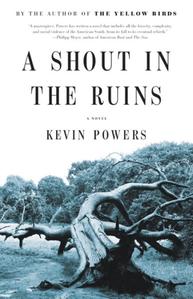
 A Shout in the Ruins is Kevin Powers's follow-up to his acclaimed debut, The Yellow Birds. It's an ambitious sophomore effort that draws from more than a century of American history, centering on the legacy of slavery and the Civil War. Beginning in the antebellum South, Powers introduces us to the Reid family: Emily; her father, Bob; and their slaves, Aurelia and her son Rawls. Emily and Rawls grow up in close proximity but separated by a wide gulf. Even as a young boy, Rawls notes that Emily's pain differs from his "in source and scope. While hers came from a rare remonstration by her father, his was inscrutable and vast." As they grow older, they grow only farther apart, before being reunited by the cruel plantation owner Levallois and the changes brought on by the Civil War.
A Shout in the Ruins is Kevin Powers's follow-up to his acclaimed debut, The Yellow Birds. It's an ambitious sophomore effort that draws from more than a century of American history, centering on the legacy of slavery and the Civil War. Beginning in the antebellum South, Powers introduces us to the Reid family: Emily; her father, Bob; and their slaves, Aurelia and her son Rawls. Emily and Rawls grow up in close proximity but separated by a wide gulf. Even as a young boy, Rawls notes that Emily's pain differs from his "in source and scope. While hers came from a rare remonstration by her father, his was inscrutable and vast." As they grow older, they grow only farther apart, before being reunited by the cruel plantation owner Levallois and the changes brought on by the Civil War.
The narrative also adopts the point of view of George Seldom, who, as a very old man in 1956 North Carolina, searches for evidence of his childhood. Seldom's parentage and true age are a mystery to him as an orphan coming out of the chaos from the Civil War, and he frequently ventures into the past through recollections of a hard life now approaching its end. Powers's cast of characters is large for a relatively short book, and one of the pleasures of A Shout in the Ruins is the way it serves as a jumping-off point for a dozen or more separate but interwoven stories from a variety of perspectives. Seldom is a major character, but just as much attention is paid to a waitress he meets in a diner, whose long and extraordinary life stretches well into the 1980s.
Powers has given himself great freedom to explore and meditate on a wide swath of American history. He seems to align with one of his characters when she reflects that "very often the world is cruel... and decorating the world does not disguise its cruelty; it simply digs its foundations deeper." A Shout in the Ruins is suitably unvarnished, but not without moments of beauty or deep emotion. Even the cruelest character, Levallois, is far from a caricature. Instead, he is a man who "often mistook inevitabilities for evidence that the world still bent to his will."
As Emily's and Rawl's stories progress into the early days of Reconstruction, Seldom's memories eventually stretch back to the same era. The characters that swirl around them--Emily's Confederate veteran father, a boy who survives by picking the pockets of dead soldiers, the leader of a band of mutinous soldiers--sometimes interact in surprising ways. According to Powers, Rawls hated one notion more than anything: "that if white folks just believed they would be good in a different world, a world that did not exist, then that made them good in the one that did." A Shout in the Ruins brushes aside myth and romanticism for a clear-eyed look at American heritage. --Hank Stephenson, bookseller, Flyleaf Books, Chapel Hill, N.C.
Shelf Talker: A Shout in the Ruins is a short but sprawling novel that follows slaves, plantation owners, orphans, veterans and many more from the antebellum South to the 1980s.

